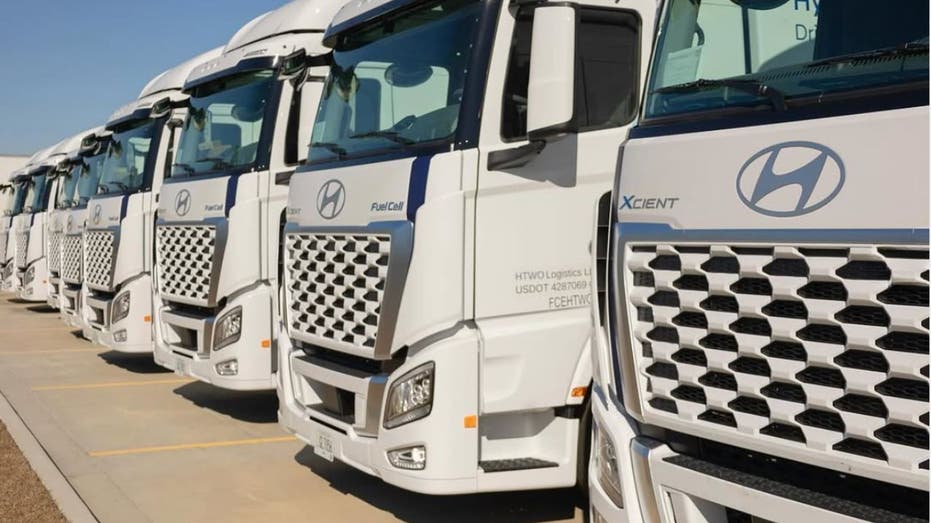Hydrogen-Powered Trucks Revolutionize Logistics in Georgia

Imagine a world where trucks traverse highways without emitting harmful pollutants. This vision is becoming a reality as Benore Logistic Systems Inc. introduces 14 Hyundai Xcient hydrogen-powered trucks to its fleet in Savannah, Georgia. This significant move not only emphasizes Benore’s commitment to sustainability but also positions the company as a pioneer in integrating eco-friendly technologies into freight transportation.
The Journey Begins
Benore’s venture into hydrogen-powered logistics began in 2022 with the introduction of four fuel cell trucks. Building upon this initial success, the company has now expanded its fleet with an additional 14 hydrogen fuel cell trucks. These vehicles are operating on dedicated routes in Savannah, specifically serving the Hyundai Motor Group Metaplant America, which is focused on clean logistics operations. Remarkably, these trucks boast an all-electric range of nearly 250 miles, representing a major advancement in sustainable transport.
-
Australian 3D Printing Robot Charlotte Sets New Standards with Rapid, Sustainable Home Construction

- Breakdown: ASUS ROG Strix SCAR 18 (2025) with RTX 5080
- Blockchain Technology: From Cryptocurrency Origins to Diverse Applications
-
Robotic Dog Jennie: A Breakthrough Companion for Mental Health Support

Dennis Kunz, Vice President of Revenue Strategy and Operation Development at Benore, emphasized the significance of this initiative, stating, “These hydrogen fuel cell trucks represent a significant step forward for Benore and our ability to deliver innovative, sustainable logistics solutions.” This commitment showcases Benore’s dedication to making a positive environmental impact.
Collaborative Efforts for a Greener Future
The deployment of these hydrogen-powered trucks is part of a larger collaboration involving Benore, Hyundai Motor Group, and HTWO Logistics—a joint venture between Hyundai and Glovis America. While Hyundai manufactures the trucks, HTWO Logistics oversees their deployment, and Benore manages daily logistics, ensuring seamless operations for the Glovis EV contract. This partnership highlights Benore’s commitment to providing innovative and sustainable solutions that align with its Just-In-Time and Just-In-Sequence operations.
Investing in Infrastructure
To support this ambitious initiative, HydroFleet has invested $33 million in establishing a hydrogen production and refueling hub near Savannah’s busy container port. Initially, this facility will support the refueling of up to 14 trucks daily, with plans to expand that capacity to 50 trucks per day in the future. Such infrastructure investments are vital for expanding hydrogen-powered freight solutions across the region.
Joining the Hydrogen Movement
Benore’s adoption of hydrogen-powered trucks aligns with a growing trend in the industry, as it joins major players like Werner and DHL Supply Chain in embracing this clean technology. Hyundai has emerged as North America’s leading supplier of hydrogen fuel cell trucks, maintaining its momentum despite challenges faced by competitors like Hyzon and Nikola. The increasing interest in hydrogen technology stems from its significant potential to reduce emissions, with each Class 8 truck capable of eliminating over 400 metric tons of CO2 annually.
Challenges on the Horizon
However, transitioning to hydrogen fuel cell trucks is not without its challenges. High initial costs present a significant barrier, particularly for smaller companies, due to the expensive nature of fuel cell technology and specialized hydrogen storage systems. The slow development of hydrogen fueling infrastructure remains a critical challenge that hinders widespread adoption. Furthermore, the current hydrogen production landscape, which largely relies on methane-based processes, does not fully meet the desired environmental standards.
Ongoing Technological Advancements
Technological refinement is essential, with continued testing required to verify range estimates, assess performance across various conditions, and address maintenance issues that affect fueling station uptime. Achieving cost parity with diesel fuel is crucial for mass adoption; estimates suggest that hydrogen must be priced at $4-$5 per kilogram to compete with diesel, currently priced at $3-$4 per gallon.
Despite these challenges, the potential for significant emissions reduction continues to drive interest and investment in hydrogen fuel cell technology within the trucking industry. As companies like Benore lead the charge, the sector is keenly observing how these early adopters navigate obstacles and pave the way for a cleaner future in heavy-duty transportation.
The Future of Hydrogen-Powered Vehicles
Hydrogen-powered vehicles are sparking interest for their potential to revolutionize transportation. However, their success depends on overcoming economic, environmental, and logistical challenges through innovation and collaboration. Key areas for future exploration include:
– Cost-effectiveness of hydrogen fuel
– Development of robust fueling infrastructure
– Environmental impact assessment
– Safety protocols for hydrogen usage
Benore’s expansion into hydrogen-powered trucking represents more than just a business initiative; it signifies a commitment to the future of logistics. By embracing cutting-edge technology and sustainable practices, Benore is setting a benchmark for others in the industry. As Kunz aptly noted, these initiatives pave the way toward cleaner transportation solutions that benefit both the planet and future generations. With Savannah serving as a hub for innovation, this partnership heralds a promising chapter in the evolution of green logistics.
What are your thoughts on the potential benefits of hydrogen fuel cell trucks, such as zero emissions and faster refueling? Do you believe they can overcome their current challenges, or are they destined to remain a niche technology? Share your insights with us.
For more tech tips and updates, consider subscribing to the CyberGuy Report Newsletter. Our newsletter offers valuable information and security alerts to keep you informed.
